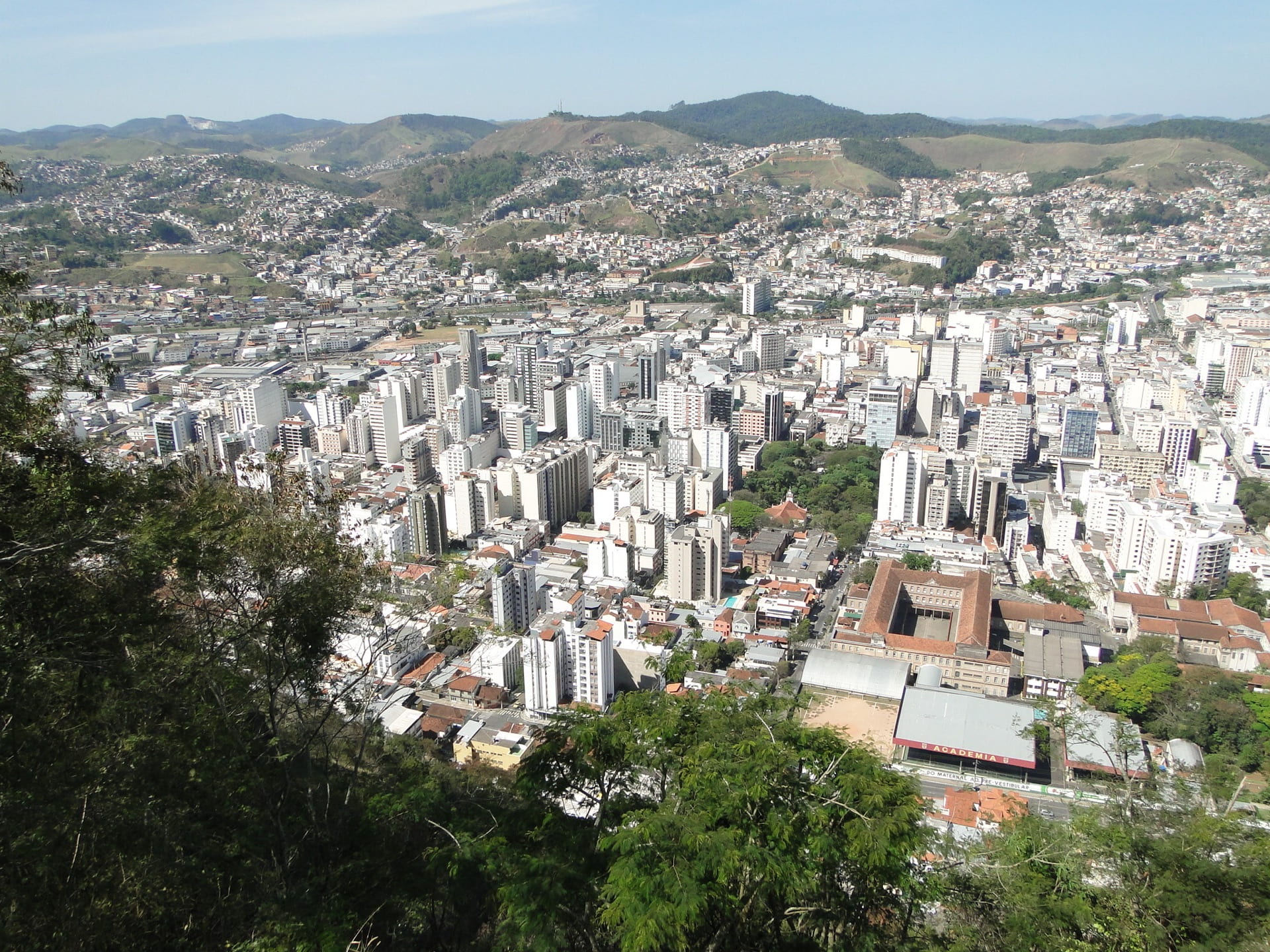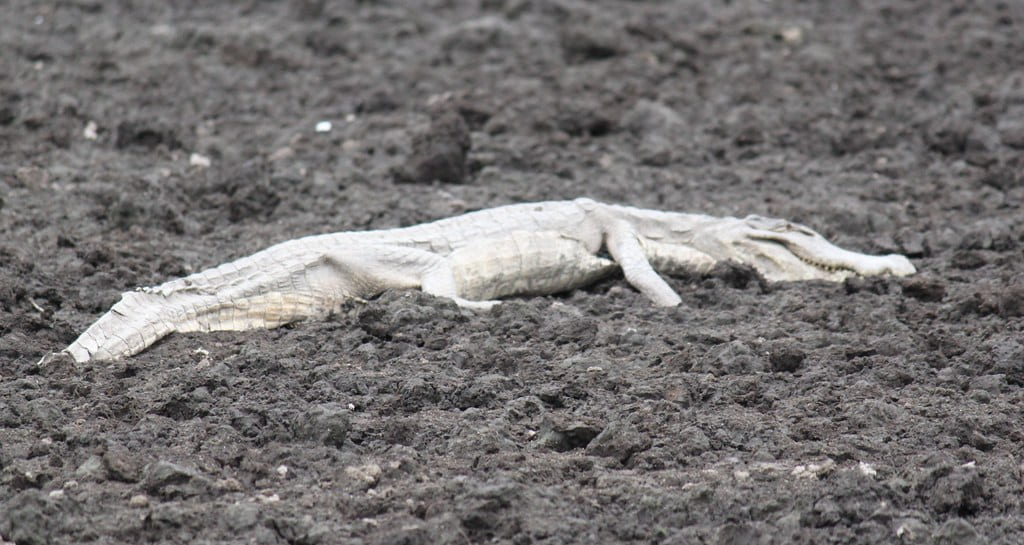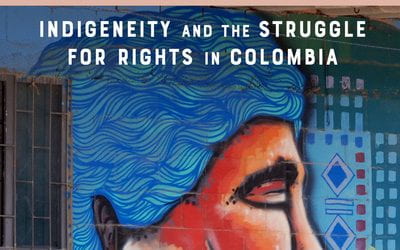Water of Life
Religion, Drought and Fire in Brazil
As I was conducting fieldwork in Brazil in 2014 for my recent book, about half the country was in the first year of a drought that would last through 2017. I was living in Juiz de Fora, a medium-sized city in the state of Minas Gerais, about three-hours inland from Rio. To get there from the United States, I had to fly into Rio and make my jetlagged way to the Novo Rio bus station to catch an Útil megabus that precariously traversed the low, rolling Serra do Mar mountain range to arrive at the brown Paraibuna River.

Juiz de Fora, Brazil. “File:Vista do centro de Juiz de Fora-MG.JPG” by Rcandre is licensed under CC BY-SA 4.0
This was my second time living in Juiz de Fora—I had collected some of the data for my dissertation there in 2008 and 2009. I remembered the torrential rains that began late in 2008, sheets of water falling for hours and days on end past the windows of my eighth-floor apartment, turning paved streets into small creeks, rains stretching in rivulets that reached all the way to February of the following year. Juiz de Fora’s rains of 2008–2009 had reminded me of the all-absorbing, earth-shaking thunderstorms of my childhood summers in central Texas. In Juiz de Fora, though, the downpours just went on and on. I knew from science textbooks that latitude, rotation of the earth, wind patterns, and vegetation together determine how much rain a location receives—but it’s easy to imagine Yahweh’s wrath behind a rain like that, and to hear his voice guiding Noah to build a big wooden boat 300 cubits long and 30 cubits high. Riding out the rains from the little ark of a high-rise downtown condomínio, the rainy season is something spectacular to watch.
But in 2014, the rains didn’t come. As the tropical winter receded and scarf weather turned to sleeveless dress weather, little showers came here and there, but not the big, long rains that replenish reservoirs and rivers. By September, people were talking about the drought—not only on the daily news shows, but to strangers on the streets and even in church.
What they said surprised me, conflicting with my own rationalist explanations of what we were all experiencing. What, for instance, did prayer have to do with rain? I began asking new questions, pursuing one puzzle after another. As I’ve followed those questions over the past six years, I have begun to understand how Brazilians integrate their interpretations of climate change with religious, scientific and political worldviews.
In 2021, Brazil faces immense environmental challenges under the presidency of the far-rightist Jair Bolsonaro, as deforestation in both the Amazon and the Pantanal wetlands is on the rise and agribusiness interests have grown in power. Domestic environmental groups and international actors—including the new Biden administration—seek the mechanisms of effective pressure on the Brazilian administration. My current book project, The Burning Bush: Religion and Climate Change in Latin America, argues that understanding how citizens and religious groups frame climate change and environmental devastation may ultimately be essential for addressing these issues in Brazil.
Back to 2014. I was attending a lot of church: almost every day of the week, often several times a day as part of my fieldwork. To be precise, I was attending a lot of different churches. My young children, Oscar and Adam, and husband Tibi and I had come to Juiz de Fora in July under the auspices of a Fulbright Fellowship so I could study the rise of religiously engaged politics in Brazil, through a case study of the campaign and aftermath of the 2014 presidential election. My research plans said nothing about climate change or environmental attitudes. Drought, however, inserted its dry fingers into all of our lives, and into my research agenda.
My little scholarly epiphany happened on a sunny Sunday morning in September, in the adult Sunday School for women at the conservative, working-class Church of the Nazarene in one of the neighborhoods I was studying. The metal garage door covering the front wall was rolled up, and mellow, indirect daylight streamed in on the pews. Sister Lídia, however, was angry (Lidia is not her real name, but it’s the one I used in my 2019 book to protect subjects’ privacy per Institutional Review Board requirements). To quote at length from my own book, Religion and Brazilian Democracy: Mobilizing the People of God (2019, Cambridge University Press):
Sister Lídia told the fifteen of us assembled that morning that the drought the region was experiencing at the moment “has an explanation. God is the Lord. God will send rain when it’s the right moment.” It was up to all of us to pray for rain, and to teach our children to pray—but she also implied that political leaders had extra responsibility. Referring to the PT [Workers’ Party], she argued that, “One party in the country said that it was the salvation of the nations, but it’s not like that….I said years ago, if God sends a drought to Brazil, we’ll see if [former President] Lula is going to be able to make it rain.” (pp. 73–74) She compared the PT’s spiritual perfidy to the Islamic State: “The Islamic religion doesn’t preach violence. It’s the Islamic State, falsely acting in the name of Islam. And in Brazil, too, the LGBT movement is doing this in the name of the people.”

Dead alligator in the Pantanal due to drought. “Jacaré morto em função da seca deste ano.” by luizmrocha is licensed under CC BY-SA 2.0
Nothing about this little lecture made sense to me. By 2014, Luiz Inácio Lula da Silva had been out of office nearly four years. Regardless of his allegedly heathen ways, how could one blame them for a drought that had just begun? What connection did Sister Lídia imagine between “the LGBT movement” and rain? And how did she understand prayer working to bring rain?
In the following weeks, I started asking other people what they thought was going on. It began with little side conversations, then I added questions to focus groups and surveys. I discovered that Sister Lídia was unusual in blaming the PT, but everyone was praying for rain.
Around the globe, weather and the environment are ubiquitous elements of indigenous spiritualities. Entities—beings—like mountains, floods, droughts, and wind recur as protagonists and plot devices in the sacred stories and symbologies of traditional peoples with such regularity that we can surmise these are core elements of what we Westerners call “religion.” In the Abrahamic traditions, God is bigger than and outside the elements, yet God makes Godself known through them, turning them on and off at God’s will. Noah’s Great Flood. Moses’ burning bush. The author of the biblical book of Kings describes how the Prophet Elijah meets Yahweh on a mountain: “A great and powerful wind tore the mountains apart and shattered the rocks before the Lord, but the Lord was not in the wind. After the wind there was an earthquake, but the Lord was not in the earthquake. After the earthquake came a fire, but the Lord was not in the fire. And after the fire came a gentle whisper” (NIV, 1 Kings 19:11-12). In the Christian Bible, the Holy Spirit moves through the water of the Jordan River in baptism, and through fires that convey the gift of miraculous polyglotism in the Book of Acts.
In our cruel contemporary moment, we have come to understand that everywhere humans go, they change the elements and the forces of nature. Raw sewage runs into the Amazon River; human actions cause the forests to dry out and catch fire. As our stone-age forebears swept across the Western hemisphere from north to south, mass extinction events followed their arrival. This alters how we understand the image of God moving through supposedly “natural” processes. Would the earthquake that shook Elijah have been more or less divine if it had resulted from fracking? What if the burning bush had been kindling in a savannized forest? Following Brazil’s 2019 Brumadinho mining disaster, Padre Gegê wrote eloquently of finding a “God drenched in mud”—a mud full of toxic mine tailings. Yet even in the midst of human-made disaster, humans persist in hoping for divine redemption. What does it mean to pray for relief from a drought of human origin? And does prayer distract from actually doing something to, you know, address climate change and stop cycles of drought?
The notion that religion impedes constructive environmental action permeates sectors of the environmental movement. Historian Lynn White articulated this perspective in a seminal 1967 article in Science, in which he proposed that “Judeo-Christian teleology”—in particular, the anthropocentric notion that Adam was given “dominion” over the Garden of Eden—“made it possible to exploit nature in a mood of indifference…” (p. 1205). Subsequent scholars have argued that other elements of Abrahamic doctrine might also subvert environmental action, including divine control over the weather and a predicted apocalyptic end of the world. And in the United States today, substantial scholarship demonstrates a negative correlation between conservative Protestantism and environmental concern.
Could a decades-long wave of conversions to conservative evangelical Protestantism—one beginning in the 1970s and stretching to today—also be impeding environmental protection in Brazil? The hypothesis made some sense, I thought. Following the 1992 Rio Summit, Brazil had become known globally as a leader in globate climate negotiations, and the country had managed to dramatically decrease Amazon deforestation between the early 2000s and 2012. From that point on, however, deforestation in both the Amazon and the wetland Pantanal region has gradually crept back up. It hit particularly high levels in the past two years, under right-wing President Jair Bolsonaro—a president known for his strong ties to evangelical and especially neo-Pentecostal churches.
To my surprise, however, the answer turned out to be a qualified no, as I argue in a recent article coauthored with Robin Globus Veldman, a scholar of evangelicals and the environment in the United States. Conducting focus groups in evangelical churches across Juiz de Fora in 2014, I discovered that most lay evangelicals relied first and foremost on scientific frameworks prominent in the media to explain the drought, readily referencing global warming and the failure of resource management practices. As one respondent argued, “It’s not like it’s not raining as a punishment from God…[T]here are strategies to avoid drought. The reasons it’s not raining are environmental.” (p. 348). Yet at the same time, evangelicals phrased their environmental anxieties in theological terms. To quote one Assembly of God pastor whom I interviewed.
God made the universe, and he took one celestial body that he made the earth. He put fish of all colors: yellow fish, green fish, red fish, blue fish. He put trees, all sorts of little birds. Every year he sends flowers to us in that beautiful garden. And human beings throw it away. Now man in his sinfulness destroys it all. He kills the little birds, he burns down the forests (pp. 341–2).
What’s more, I conducted survey experiments that October to examine if stimulating (in academic terms, “priming”) evangelicals to think about their religious beliefs would lead them to become less committed to environmentalist solutions. To my great surprise, however, I discovered that Brazilian evangelicals became more concerned about ending deforestation when they reflected on the statement that “God is in control of everything.” In short, there was little evidence that evangelicals’ beliefs were inhibiting environmental concern.
Evangelicals are not alone. In a working paper based on a survey conducted in 2019 in the leadup to the Catholic Church’s regionwide Amazon Synod, I find that 84% of Brazilian Catholics agree that “it’s a sin for human beings to attack the Amazon.” Pope Francis has famously raised the theological profile of environmental concerns within the Church, most prominently in his encyclical Laudato Si’. As I have argued elsewhere, however, in Brazil the Pope’s message has only magnified preexisting environmentalist currents in the Church.
The answer to Brazil’s environmental problems is not as simple as framing environmental demands in religious terms. Indeed, religious citizens are already doing so. Instead, both environmental movements and religiously inspired ecologists will need to work hard to build organic grassroots movements that better integrate environmental demands into religious life. Such movements, however, have great potential for fueling the fire of demand for ecological renewal.
Winter 2021, Volume XX, Number 2
Amy Erica Smith is an associate professor of political science, as well as a Liberal Arts and Sciences Dean’s Professor, at Iowa State University. In 2020–2022, she is a Carnegie Fellow; her current research examines religion, environment, democracy and the right in Latin America.
The reflections in this essay are based on fieldwork and research leave supported by the Global Religion Research Initiative (2018–2019); a Luce/ACLS Fellowship in Religion, Journalism, and International Affairs (2019–2020); the Woodrow Wilson Center for International Scholars (2019–2020); and the Carnegie Corporation (2020–2022), as well as a 2014 Fulbright Fellowship and support from Iowa State University’s College of Liberal Arts and Sciences and the University of Wisconsin-Milwaukee’s Center for Latin American and Caribbean Studies (2019).
Related Articles
Indigenous Peoples, Active Agents
Recently, the Amazon and its indigenous residents have become hot issues, metaphorically as well as climatically. News stories around the world have documented raging and relatively…
Beyond the Sociology Books
If you are not from Colombia and hoping to understand the South American nation of 50 million souls, you might tend to focus on “Colombia the terrible”—narcotics and decades of socio-political violence…
Exodus Testimonios
The audience at Iglesia Monte de Sion was ecstatic as believers lined up to share their testimonials. “God delivered us from Egypt and brought us to the Promised Land,” said José as he shared his testimonio with the small Latinx Pentecostal church in central California…





